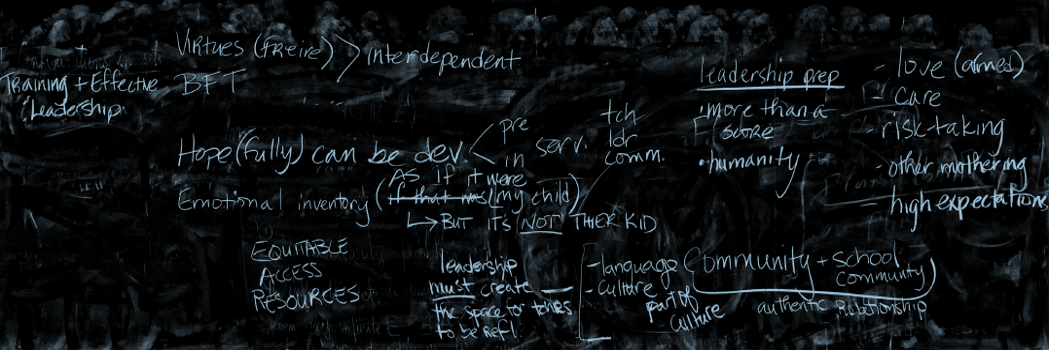I really enjoyed this week’s readings for many reasons. First of all, similar to the week when we read about the womanist ideology, this week’s readings built upon the work of Paulo Freire. What I love so much about the way that these readings were curated is that I can clearly see the way that ideas develop over time in academia, and I can begin to see myself entering into a conversation such as the one that unfolded over this week’s readings.
In addition to one another, this week’s readings built on a couple of themes that I have been thinking about in this class. For instance, the idea of caring or loving educators being willing to take on risk was touched on in many readings. Rosa’s piece gave two current and specific examples of the risks that educators undertake when they approach the role of principal through the framework of armed love. Further, Friere and Darder spoke specifically about the concept of fear and how fear is a necessary element of our quest for liberation. As someone who is very interested in studying emotions, I really enjoyed the way that Friere approached fear. Rather than as something to run away from, to Friere fear is an indicator that you are an educator that is on the right path. Only by recognizing and working through fear can we develop courage. This discussion of fear reminded me of Audre Lorde’s idea that we can learn to work through fear like we learn to work through exhaustion. (She said it much more beautifully, but I cannot find the quote right now.) I find this conception of fear as a bearable companion especially meaningful when coupled with Darder’s assertion that “many administrators … instill a fear of freedom.” Not only can we work through fear, but we must because anything worth doing is scary by design.
Lastly, I found comfort in Miller’s reminder that Freire’s work is not a “radical recipe.” Sometimes I get frustrated as a teacher-educator because I mostly teach white women of relative privilege. Thinking about education “that transforms the space where children, rich or poor, are able to learn, to create, to take risks, to question, and to grow” helps me to see the ways that even those of privilege can learn to fight to change the status quo.




Ahh! I am also so fascinated by emotions, Kushya. The way in which Freire describes fear, he resists the masculinized, white supremacist, and capitalist connotation of the emotions. I often think about how our emotions, which truly make us human have been placed within hierarchies, deemed positive and negative based on markers of patriarchy, white supremacy and capitalism (all ideologies that directly oppose our humanity). I think about bell hooks’ book “All about Love” where she explores/dissects the emotions of love and the vulnerability and ethical risk within the experience. Also, I am super interested in the quote you were trying to cite from Audre Lorde. If you find it, I would love to know!